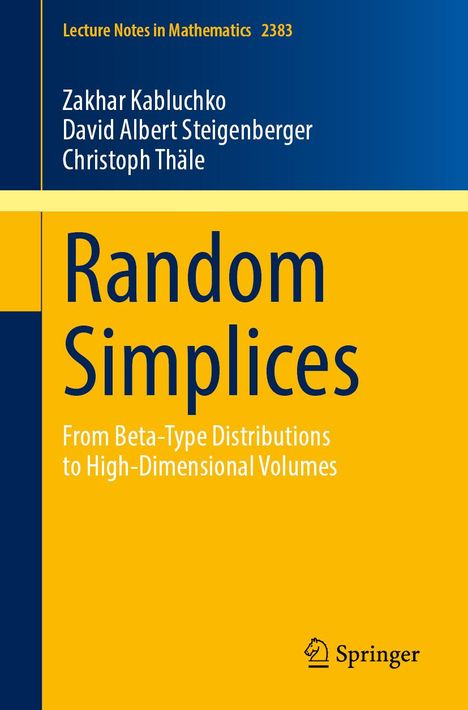Zakhar Kabluchko: Random Simplices, Kartoniert / Broschiert
Random Simplices
- From Beta-Type Distributions to High-Dimensional Volumes
Sie können den Titel schon jetzt bestellen. Versand an Sie erfolgt gleich nach Verfügbarkeit.
- Verlag:
- Springer-Verlag GmbH, 03/2026
- Einband:
- Kartoniert / Broschiert
- Sprache:
- Englisch
- ISBN-13:
- 9783032028631
- Artikelnummer:
- 12360202
- Umfang:
- 300 Seiten
- Sonstiges:
- XVI, 300 p. 1 illus.
- Erscheinungstermin:
- 29.3.2026
- Serie:
- Lecture Notes in Mathematics - Band 2383
- Hinweis
-
Achtung: Artikel ist nicht in deutscher Sprache!
Klappentext
This book provides an introduction to the theory of random beta-type simplices and polytopes, exploring their connections to key research areas in stochastic and convex geometry. The random points defining the beta-type simplices, a class of random simplices introduced by Ruben and Miles, follow beta, beta-prime, or Gaussian distributions in the Euclidean space, and need not be identically distributed. A key tool in the analysis of these simplices, the so-called canonical decomposition, is presented here in a generalized form and is employed to derive explicit formulas for the moments of the volumes of beta-type simplices and to prove distributional representations for these volumes. Three independent approaches are described, including the original Ruben--Miles method. In addition, a version of the canonical decomposition for beta-type polytopes is provided, characterizing their typical faces as volume-weighted beta-type simplices. This is then applied to compute various expected functionals of beta-type polytopes, such as their volume, surface area and number of facets. The formulas for the moments of the volumes are also used to investigate several high-dimensional phenomena. Among these, a central limit theorem is established for the logarithmic volume of beta-type simplices in the high-dimensional limit. The canonical decomposition further motivates the study of beta-type distributions on affine Grassmannians, a subject to which the last chapter is dedicated.
Largely self-contained, requiring minimal prior knowledge, the book connects these topics to a broad range of past and current research, serving as an excellent resource for graduate students and researchers seeking to engage with the field of stochastic and integral geometry.

